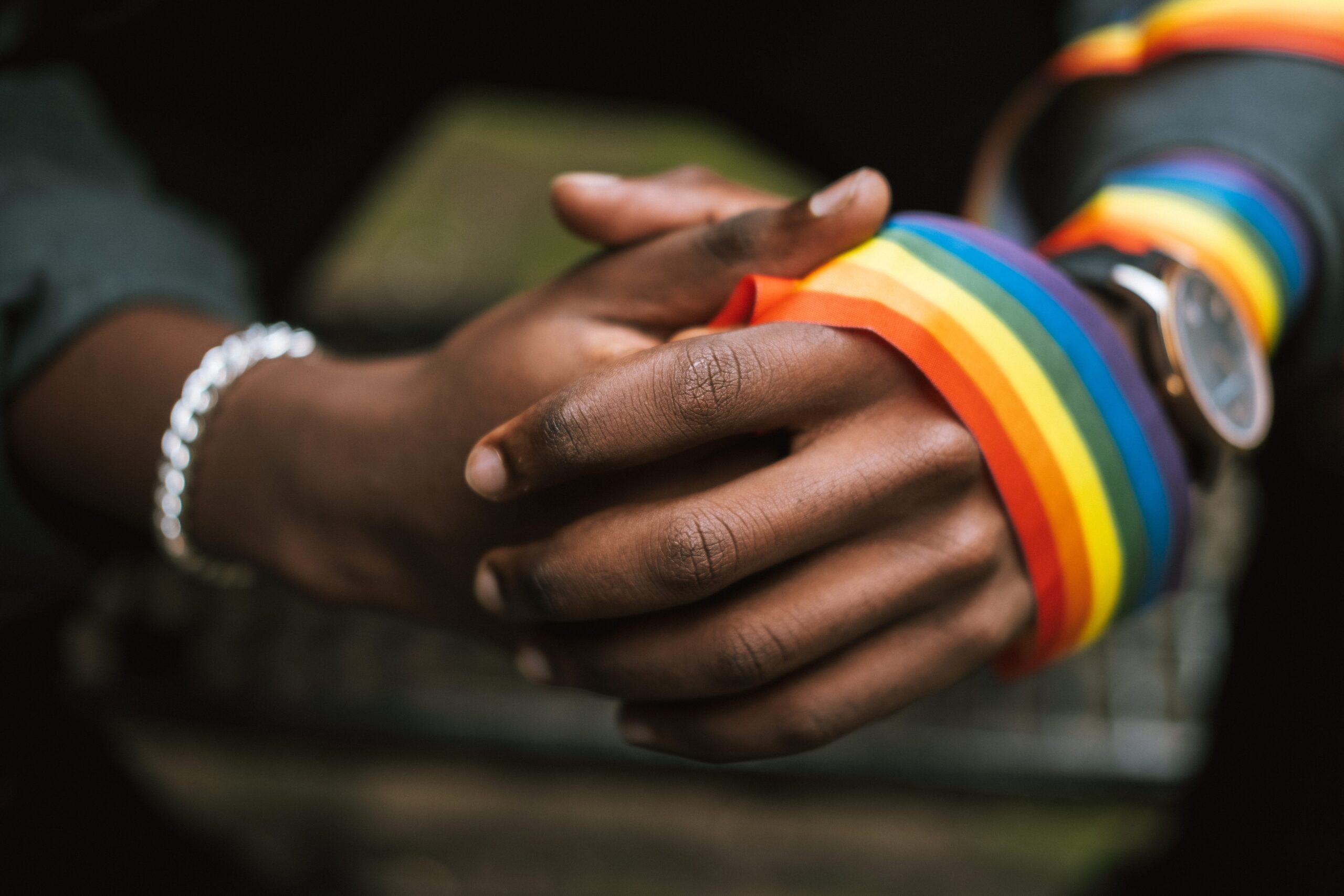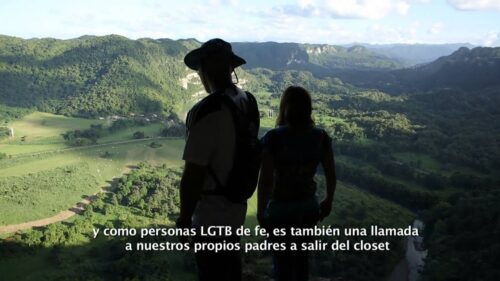An excellent new book by Jason Steidl-Jack traces the evolution of LGBTQ Catholic ministry in the Catholic Church in the United States. Many of the same things that were said decades ago regarding gays and lesbians are now being refocused against the transgender and non-binary community. This time, these claims are more powerfully and politically financed, with social media being used to incorporate exaggerations, scare tactics and un-truths.
While our church has come a long way in the last ten years in terms of LGBTQ acceptance and inclusion, there is still quite a ways to go.
Attacks against trans and non-binary persons seem to appear almost every day, from politicians and individual state laws denying healthcare; to dioceses issuing restrictive guidelines; and to famous individuals coming out against trans rights, like J.K. Rowling. Everyone seems to have an opinion on who we are, our right to exist and our “agenda”—as if asking to be treated with dignity is an agenda.
Often, these policies and opinions are presented with little understanding of transgender or non-binary lives, and come from people who have had little interaction or communication with us. Since many do look to church leadership for guidance, words matter. Words also hurt, and much of what we’re hearing and reading do not reflect the lived reality of our transgender and non-binary selves.
The recent U.S.C.C.B. doctrinal note adds to a disappointing string of recent church publications. It re-emphasizes the Book of Genesis, ignores modern medical science and condemns any gender-affirming care as an immoral manipulation of the body, contrary to the will of God.
The worldwide synod illustrates a church willing to reach out to those on the margins, hopefully including a long overdue acceptance of LGBTQ persons. The U.S. Conference of Catholic Bishops, however, appears again to have not engaged in any in substantive conversations with transgender and non-binary persons to better understand our lives.
Everyone seems to have an opinion on who we are, our right to exist and our “agenda”—as if asking to be treated with dignity is an agenda.
Quoting Popes Pius XI through Francis, the U.S.C.C.B. argues that medical intervention of any kind is a type of genetic engineering for purposes other than medical treatment. But their argument that medical intervention may be allowed “for the welfare of the body, there being no other options for securing the welfare of the body as a whole” is exactly the reason why gender-affirming care should be justified. The physical, mental and spiritual well-being of transgender and non-binary persons depend on it.
Other recent guidance has been published by local dioceses. One of the most recent policies to address gender issues has been the Archdiocese of Portland, Ore. While attempting to stress love and compassion, the diocesan document characterizes my existence, and that of other transgender and non-binary persons, as a “subjective and disassociated self-perception.”
Other similar guidance holds that it is un-Catholic to acknowledge transgender persons. Rather, they say, Catholics should reject affirming transgender or non-binary person of any age, whether a family member or child and at school, the workplace, or society at large. Any accommodation of a person’s transition—social, medical or surgical—should be objected to and publicly refused.
These guidelines also stress “whole-person affirmation, body and soul.” As a lifelong Catholic, who has known since early childhood that she was transgender, I ask: “Who defines who I am? Whose truth are we talking about? Who has the right to tell me what lies within my heart, mind and soul?”
Reliance on Genesis alone, Catholic anthropology and natural law would dictate gender is determined by sexual differences only. Attempts are made to wed gender and sex irrevocably and inseparably, so that one’s D.N.A. becomes the whole truth of who one is, rather than one facet of a person’s identity. Being transgender or non-binary is seen as a threat to family life.
If our faith, however, teaches us that we are all made in the image and likeness of God, we must ask: Is God male or female? Is God both? Does sex or gender really matter in our personal faith journey ?
As a lifelong Catholic, who has known since early childhood that she was transgender, I ask: “Who defines who I am?”
The theologian Evelyn Whitehead in her book Fruitful Embraces, reflect on Genesis 1:27:
It cannot be in our maleness or femaleness that we reflect God, but from our capacities for love and compassion and justice. To reflect only upon the rigid dichotomy of male and female, and of procreation, leaves little space for the extravagant paradoxes throughout Scripture.
The revelations given in many scripture events challenges a rigid view of human nature. The life of faith surpasses the bounds of the natural. We come to see human nature is not simply biologically determined. Natural is not primarily what we are given, but rather what we are called to become.
Catholic theologians have been grappling with new information about the human person for centuries. Theologians like James Alison, Daniel Horan, O.F.M., and Craig Ford have written about the need for a new understanding of natural law that includes the natural reality of LGBTQ people in a non-stigmatizing, non-ostracizing way.
Ish Ruiz, a theologian and educator, states, “Catholic doctrine on gender and sexual orientation must form an integral part of the dialogue on LGBTQ+ inclusion. At the same time, it should be placed in the broader context of the Catholic tradition. …As Pope Francis wrote in “Amoris Laetitia:” “We [the Church] have been called to form consciences, not replace them.”
Daniel Horan, a professor and director of the Center for Spirituality at St. Mary’s College, in Indiana, writes that “The right to a name and pronouns that reflect one’s full dignity is not just a human right, it is one rooted deeply in the Christian tradition.”
And the Christian author Brandon Robertson has written, “True inclusion demands that we recognize that only in our diversity do we more perfectly reflect the divinity of our expansive Creator. Discomfort is not an excuse to marginalize or exclude, rather it is a sign that we are being called to go deeper, to do the hard work of getting to know another person and to work on our own shadows that predispose us to discriminate.”
In a recent New Ways Ministry post, executive director Francis DeBernardo reflected on the life of Bishop Matthew Clark, who ministered to the lesbian and gay community 30 years ago, when church leaders were instructed to be very cautious with such support.
Bishop Clark’s words are as insightful now as they were then. “We need to learn more about this reality. I think the church’s present disposition is based on a certain body of facts and experience and that’s to be honored and I intend to honor it. But we need to continue learning from new facts and new experiences and I don’t know with enormous clarity what tomorrow’s church might say about the issue we’re talking about today.”
Bishop Clark’s words were echoed by the Rev. Thom Hennen, the vicar general of the Diocese of Davenport, Iowa, in December 2021. On about transgender and nonbinary persons, he wrote, “This notion that we have to choose either to be faithful to our Catholic teaching on the nature of the human person, or welcome, love and accompany transgender persons is really a false choice. In fact, it is precisely our understanding of the dignity of the human person that should motivate our love for transgender persons.”
The theologian James Whitehead, who often wrote with his wife Evelyn, often uses the word “bewilderment,” a theme seen again and again in Scripture. He defines it as “confusion arising from inability to grasp or see one’s way through a maze or tangle of impressions or ideas, the feeling we experience when confronting the puzzling world that derails the confidence we have counted on.”
“Theologian Ish Ruiz states, “Catholic doctrine on gender and sexual orientation must form an integral part of the dialogue on LGBTQ+ inclusion.”
He writes, “Bewilderment leads to humility about what we know … and what we don’t know. It is through bewilderment and humility that we open ourselves to God’s extravagant universe. We begin to understand gender diversity to be a gift of God, intended to add to the rich variety of human experience and perspective.”
Jesus’s apostles spent much of their time bewildered over what they had seen. And throughout time, our church has been bewildered by once-unexplainable issues or events.
As my friend Hilary Howes, a transgender Catholic, has said: “Ultimately, welcoming the mystery of diversity in God’s plan, is the healing for our church for which I most hope.”




